Verdi – Don Carlo
Don Carlo – Charles Castronovo
Tebaldo – Erika Baikoff
Elisabetta – Maria Agresta
Conte di Lerma – Galeano Salas
Rodrigo – Boris Pinkhasovich
Filippo II – John Relyea
Eboli – Clémentine Margaine
Carlo V – Alexander Köpeczi
Grande Inquisitore – Dmitry Ulyanov
Un araldo reale – Galeano Salas
Voce del Cielo – Jessica Niles
Deputati fiamminghi – Christian Rieger, Andrew Hamilton, Thomas Mole, Daniel Noyola, Roman Chabaranok, Gabriel Rollinson
Extrachor der Bayerischen Staatsoper, Bayerischer Staatsopernchor, Bayerisches Staatsorchester / Daniele Rustioni.
Stage director – Jürgen Rose.
Bayerische Staatsoper, Munich, Germany. Friday, July 28th, 2023
Tonight’s Don Carlo represented another aspect of the Munich Opera Festival – well-cast revivals of repertoire stagings. Tonight was also notable for being Charles Castronovo’s debut in the five-act version of the title role. Castronovo was due to make his role debut here in 2020, but this was cancelled due to the plague. Instead, he sang the four-act version in Romania last season, and will be making his debut in the original French version in Geneva this fall. The Staatsoper assembled around him an extremely enticing cast, with the house forces under the direction of Daniele Rustioni, who also conducted last night’s Aida.
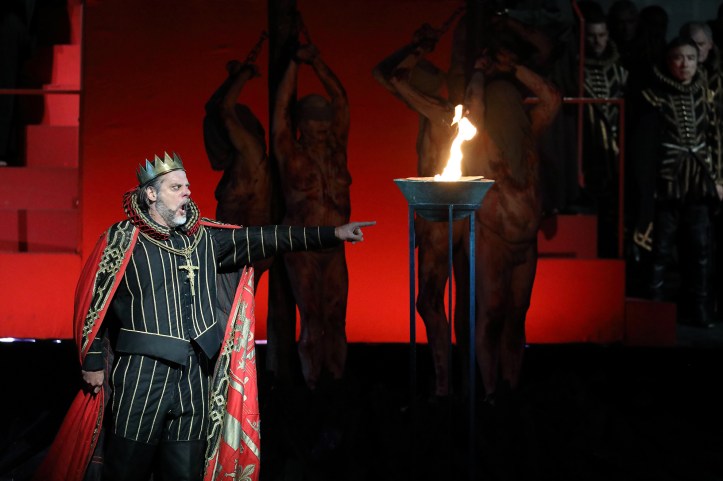
The staging, by Jürgen Rose here revived by Markus Koch, was premiered at the 2020 edition of the festival. It’s very much a traditional staging, set in period, with grand costumes – also by Rose. The set, again by Rose, contains mainly of a claustrophobic room with a huge crucifix a constant presence. The crucifix also appeared as a front cloth during scene changes. This served as a reminder of the dominating power of the catholic church over the events of the plot. Yet by staging most of the action in a relatively narrow space, the set amplifies the voices to thrilling effect – particularly in that Act 4 confrontation between Filippo and the Grande Inquisitore.

In some respects, the staging is showing its age. The doors at the back of the room are now noisy and creaky. Some of the personenregie is risible – for example the circular dancing of the sopranos and mezzos in the introduction to the veil song. Parking the chorus on the sides of the stage during the auto-da-fé also diminishes the impact of their singing. The side walls look rather flimsy, particularly when characters bumped against them, looking as if they were about to collapse. Still, Rose’s staging did what it needed to do and provided us with a setting for the singing to take flight in.
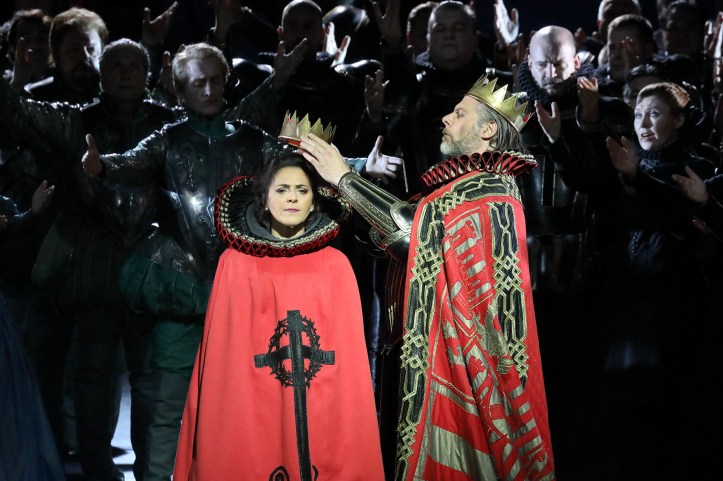
The role of Don Carlo is a major challenge for the tenor singing him in that, seconds after coming on, he needs to launch into a big, high-lying aria. Castronovo threw himself into its challenges, bringing us his customary handsome tone and diction that brought the text to life. Perhaps subsequent performances will see him pull back a little at first. Yes he did shade the aria imaginatively, but his singing was full-blooded and enthusiastic. More than any Carlo(s) I’ve seen on stage, Castronovo portrayed the optimistic lovelorn figure of Act 1 with wide-eyed innocence, making his subsequent mental breakdown all the more moving, both in his physicality and in his pointing of the text. As the evening progressed, Castronovo gave us some ringing high notes – although here again, more experience in the role will help him pace the volcanic outbursts of Act 3 with the long view in mind. Make no mistake, tonight Castronovo announced himself a major interpreter of this magnificent role and I look forward to seeing him grow in it even further.
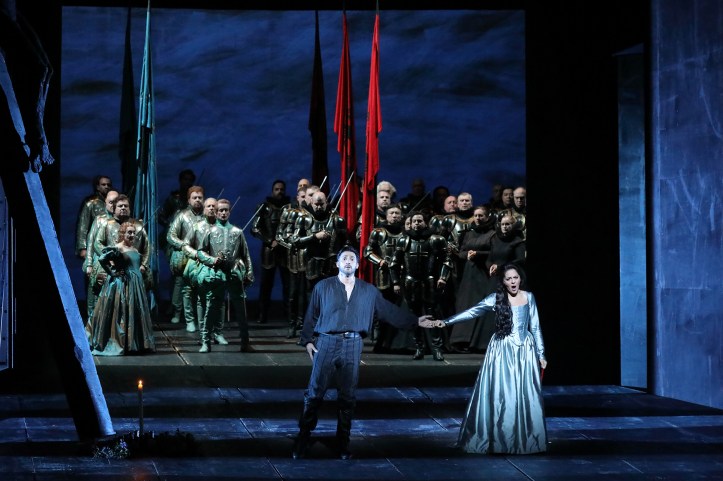
His Elisabetta was Maria Agresta, who brought a wonderfully dignified stage presence and sense of phrasing to her music. She used dynamics most intelligently, floating some beautiful soft singing high up. Her soprano has a steely core, although there were signs of an essentially lyric instrument being pushed hard in the way that the voice sat around the note, rather than directly on it, in her ‘tu che le vanità’. Still, that aristocratic line, the way Agresta used those warm Italian vowels to colour the tone, and her willingness to pull back and give us that poised soft singing, all gave much pleasure. It’s been a while since I’ve heard John Relyea and his bass is in excellent shape. The sound is big and rounded, with an attractive inky vibrato and tone that warms the room even as it descends to the sepulchral depths. His Filippo was riddled with pain, regret, and frustration. Even though his bass is such a handsome instrument, Relyea was unafraid to sacrifice the beauty of tone in his ‘ella giammai m’amò’, which emerged as a howl of pain from the depths of the soul of a broken man. It was immensely moving. His bass off with Dmitry Ulyanov’s Inquisitore was exhilarating – two huge voices sparring off one another, filling the auditorium with a mighty noise.
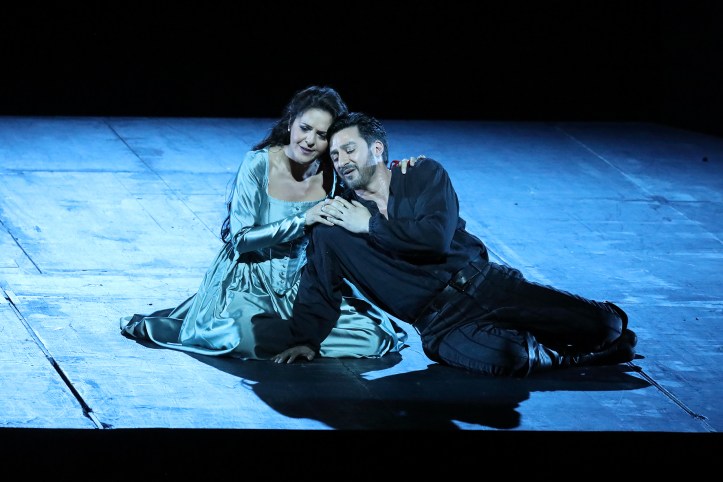
Boris Pinkhasovich, a replacement for the originally-cast Ludovic Tézier, sang Posa in a firm baritone with an easy top, an impeccable legato and a genuine trill. His duet with Castronovo’s Carlo was tremendous, both pouring streams of warm tone into the room. I did however find his final scene somewhat grandstanding. It was superbly sung, the lines seemingly endless, but felt sung to the gallery rather than finding that deep wistfulness and depth of feeling that it calls for. Clémentine Margaine gave us a sensational Eboli. Her veil song was incredibly sexy, the long melismas positively erotic in the way that she dispatched them. Her mezzo is wonderfully resonant, with an auburn core, and the registers are even from top to bottom. Her ‘o don fatale’ was sung with terrific abandon. Yes, perhaps she and we would have wanted her to hold onto the highest reaches a little more. But Margaine brought out the entire range of feelings contained within, from regret, to determination, the voice ringing out with uninhibited amplitude. Again, it was exhilarating. The remaining roles reflected the standards one would expect here. Alexander Köpeczi confirmed the extremely positive impression he made last night as Ramfis, booming magnificently in his exceptionally handsome bass. Erika Baikoff was an energetic, if verbally indistinct, Tebaldo. Galeano Salas was luxury casting in his roles, his tenor bright and evenly produced. Jessica Niles gave us heavenly singing in a liquid soprano of great pulchritude as the Voce del Cielo.
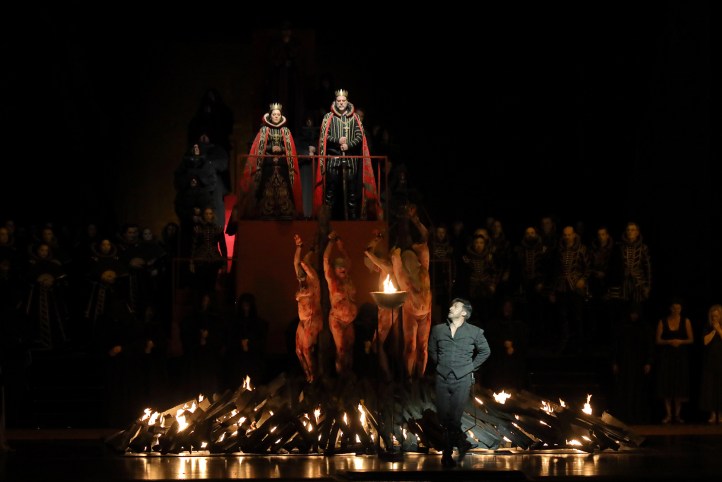
I found Rustioni’s interpretation to have many of the same traits as his Aida last night. With a more engaging cast, he was able to allow the orchestra to ring out more fully. Yet, I found his conducting to be constantly stop-start, lacking a sense of forward momentum. There were several moments where things just seemed to grind to a halt. In a way, it felt like a learner driver, experimenting with changing gears. If one had hoped Agresta might pull a Caballé on her final note and hold it forever, one would be disappointed as, as soon as that big brass motif reappeared in the final measures, Rustioni just stamped on the brakes, and pulled the tempo right back to a crawl. The orchestra played superbly for him. Yes, there were a few passages of sour string intonation, and not every entry was absolutely unanimous, but the quality of the playing was outstanding and Rustioni did get the strings phrasing with Italianate lyrical beauty. Similarly, the chorus has made huge improvements under Johannes Knecht, the tone and blend much improved on previous form, which made their placement at the side of the stage for their big moment in Act 3 all the more regrettable.
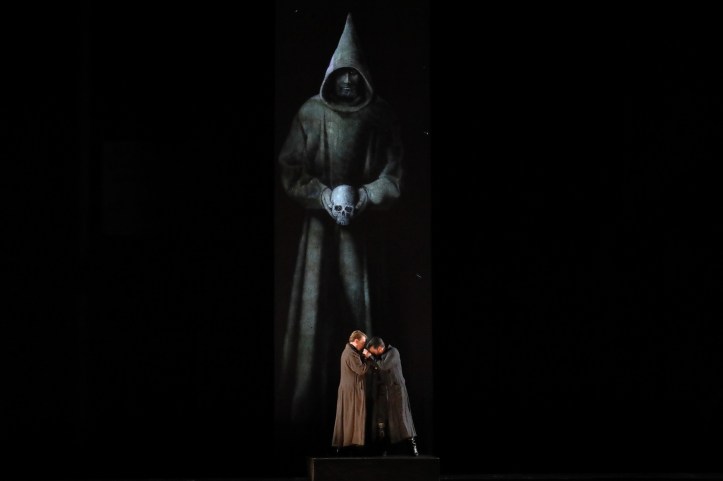
Tonight was a night that was all about the singing. And what singing we were treated to, with a cast that could hardly be bettered today. It was given in a staging that did what it needed to do, even if it’s now showing its age and is probably time to be replaced. The orchestral playing and choral singing were both superb, although Rustioni’s conducting I found less convincing. The audience rewarded the entire cast with a huge and prolonged ovation. A night anyone who was present will remember for a long time.
[…] than two months after seeing Castronovo sing the role in Italian in Munich, it was a pleasure to hear him sing the role in French here. Castronovo has long been a classy […]
[…] Margaine’s Amneris. Over the past few months, I’ve had the pleasure of seeing Margaine as Eboli, Azucena, and now as Amneris. She has most certainly arrived as one of the leading Verdi mezzos […]
[…] was a constant thread throughout the year. A performance of Don Carlo at the Munich Opera Festival in the summer was appropriately festival quality, with a terrific […]